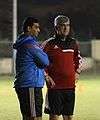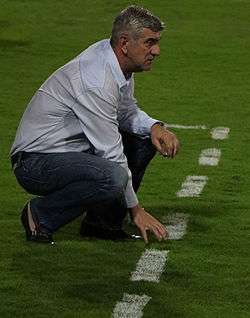Branko Smiljanić
|
Branko Smiljanić, Serbian football manager | |||
| Personal information | |||
|---|---|---|---|
| Date of birth | September 27, 1957 | ||
| Place of birth | Belgrade, FPR Yugoslavia | ||
| Height | 1.84 m (6 ft 0 in) | ||
| Playing position | Forward | ||
| Senior career* | |||
| Years | Team | Apps | (Gls) |
| 1970–1978 | OFK Beograd | 107 | (78) |
| 1978–1979 | Mercator | 40 | (20) |
| 1979–1981 | OFK Beograd | 45 | (22) |
| 1981–1983 | Sloboda Užice | 58 | (32) |
| 1983–1985 | Kalmar AIK | 60 | (38) |
| 1985–1988 | Mönsterås | 61 | (29) |
| 1988–1993 | Obilić | 78 | (48) |
| Total | 449 | (267) | |
| National team | |||
| 1974–1975 | Yugoslavia | 50 | (11) |
| Teams managed | |||
| 1993–1995 | Obilić U-20 | ||
| 1995–1996 | Obilić (Assistant Coach) | ||
| 1996–1997 | Mladi Radnik | ||
| 1997–1998 | Sloga Kraljevo | ||
| 1998–1999 | Borac Čačak | ||
| 1999–2000 | Milicionar | ||
| 2000–2002 | Jordan (Technical Director) | ||
| 2002–2003 | Sutjeska Nikšić | ||
| 2003–2004 | Al-Faisaly | ||
| 2004–2005 | Vojvodina | ||
| 2005–2006 | Al-Faisaly | ||
| 2006–2008 | Al-Ittihad | ||
| 2008–2009 | Libya U-20 | ||
| 2009–2012 | Libya | ||
| 2012–2013 | Al-Wehdat | ||
| 2013–2014 | Al-Ittihad | ||
| 2014 | Napredak Kruševac | ||
| 2015 | Saham | ||
| 2016 | BEC Tero Sasana | ||
|
* Senior club appearances and goals counted for the domestic league only. | |||
Branko Smiljanić (born 27 September 1957)[1] is a Serbian football manager, a former footballer, who is the current manager of BEC Tero Sasana.
Personal life
His son, Milan Smiljanić is a professional footballer who has played for top European clubs like FK Partizan, RCD Espanyol, Sporting de Gijón, Gençlerbirliği S.K., Maccabi Netanya and is currently playing for Perth Glory in the A-League.
Playing career
Branko began his professional footballing career in 1970 with his parent club, OFK Beograd, based in his hometown Belgrade, and played there for the next 8 years. He was also part of the squad which reached the Quarter-finals of the 1972–73 UEFA Cup. In 1978, he signed a one-year contract with FC Mercator. He moved back on a one-year contract to Belgrade and his former club, OFK Beograd. In 1981, he moved to Užice where he signed a long-term contract with FK Sloboda Užice.
He first moved out of Serbia in 1983 to Sweden and more accurately to Kalmar where he signed a long-term contract with Kalmar AIK FK. After a two-year spell with the Kalmar-based club, he moved to the city of Mönsterås where he signed a long term contract with FC Mönsterås.
In 1988, he moved back to Serbia and more accurately to Vračar where he signed a long term contract with FK Obilić and played there for the next 5 years.
Managerial career
Branko holds the UEFA Pro Licence, the highest football coaching qualification. He received the UEFA Pro Licence in 2007 from the Football Association of Serbia. He also holds the UEFA A License (from the Football Association of Serbia and Montenegro since 2005), UEFA B License (from the Swedish Football Association since 1988) and also the UEFA C License (from the Swedish Football Association since 1987). He has also obtained a graduate degree in Physical Education in 1996 from the University of Novi Sad.
Obilić
He began his professional managerial career with the U-20 team of FK Obilić in 1993. In 1995, he was appointed as the assistant coach of the first team of the club. In his one-year spell with the club, he helped them achieve the runners-up position in the 1994–95 FR Yugoslavia Cup.
Mladi Radnik
In 1996, he moved to Požarevac where he was appointed as the head coach of FK Mladi Radnik.
Sloga Kraljevo
In 1997, he moved to Kraljevo where he was appointed as the head coach of FK Sloga Kraljevo.
Borac Čačak
In 1998, he moved to Čačak where he was appointed as the head coach of FK Borac Čačak. He helped the club win the 1998–99 Second League of FR Yugoslavia (West Group) with 47 points from 14 wins and 5 draws.
Milicionar
In 1999, he moved back to his hometown Belgrade where he was appointed as the head coach of FK Milicionar.
Jordan
He first moved out of Serbia to the Middle East and more accurately to Jordan in 2000 where he was appointed as the technical director of the Jordan Football Association.
Sutjeska Nikšić
In 2002, he moved back to Europe and more accurately to Montenegro where he was appointed as the head coach of Nikšić-based club, FK Sutjeska Nikšić.
Al-Faisaly
In 2003, he moved back to Jordan and to the capital city, Amman where he was appointed as the head coach of Jordan League club, Al-Faisaly SC. In his one-year spell with the Amman-based club, he helped them secure the second position in the 2003–04 Jordan League, win the 2004 Jordan FA Cup and the 2004 Jordan Super Cup.
Vojvodina
In 2005, he moved back to Serbia and more accurately to Novi Sad where he was appointed as the head coach of FK Vojvodina.
Al-Faisaly
In 2005, he moved back to Jordan and his former club, Al-Faisaly SC. He again helped them secure the second position in the 2005–06 Jordan League and win the 2005 Jordan FA Cup.
Al-Ittihad
In 2006, he moved to the North Africa and more accurately to Libya where he was appointed as the head coach of Libyan Premier League club, Al-Ittihad Club. In his two-year spell with the Tripoli-based club, he helped them win the 2006–07 Libyan Premier League, 2006 Libyan Super Cup, 2007 Libyan Al-Fatih Cup, 2007–08 Libyan Premier League and the 2007 Libyan Super Cup. He also helped the club to reach the Semi-finals of the 2007 CAF Champions League which is till-date the best performance of the club in the competition.
Libya U-20
In 2008, he was appointed as the head coach of Libya national under-20 football team. During his one-year spell with the U-20 national team, he helped them achieve the bronze medal in the 2009 Mediterranean Games. His team first topped the Group C with two draws against Montenegro U-20 and with the help of a 4–2 penalty shootout win over the Europeans in the second match. In the Semi-finals, they were defeated 1–0 by Italy U-20 and in the Third Place match they won 8–7 on penalties against France U-20 after the match had ended 0–0 at normal time.
Libya
After a successful stint with the U-20 national team of Libya, he was appointed as the head coach of the Libya national football team on a three-year contract.
Al-Wehdat
In 2012, he moved back to Jordan where he was appointed as the head coach of Al-Wehdat SC, fierce rivals of his former club, Al-Faisaly SC. He helped the Amman New Camp-based club reach the Quarter-finals of the 2012 AFC Cup. On 31 August 2012, he was sacked by the club after a 2–0 defeat against Al-Arabi (Irbid), the club's second defeat in the past three matches.[2]
Al-Ittihad
In 2013, he moved back to Libya and to his former club, Al-Ittihad on a one-year contract.
Napredak Kruševac
In 2014, he returned to Serbia and more accurately to Kruševac where he was appointed as the head coach of Serbian SuperLiga club, FK Napredak Kruševac.
Saham
-

With Assistant Coach, Yaqoob Ismail
-

Saham SC - Technical Staff - 2014–15 Oman Professional League
On 20 November 2015, he arrived in Muscat, Oman and then moved to Saham where on 22 November 2014, he signed a six-month contract to be appointed as the head coach of Saham SC of Oman Professional League.
Achievements as manager
Honors
- With Obilić
- FR Yugoslavia Cup (0):
- Runners-up 1994–95
- With Borac Čačak
- Second League of FR Yugoslavia (1):
- Winners 1998–99 (West)
- With Al-Faisaly
- Jordan League (0):
- Jordan FA Cup (2):
- Winners 2004, 2005
- Jordan Super Cup (1):
- Winners 2004
- AFC Cup (1):
- Winners 2005
- With Al-Ittihad
- Libyan Premier League (2):
- Libyan Cup (1):
- Winners 2007
- Libyan Super Cup (2):
- With Libya U-20
- Mediterranean Games (0):
- Third Place 2009
- Best Coach Award 2006,2007,2008
References
- ↑ "Branko Smiljanić". SOCCERWAY.
- ↑ "Jordan's Al Wehdat sack head coach Branko Smiljanic". BOXSCORE.
External links
- Branko Smiljanić – Official Website
- Branko Smiljanić – GOAL
- Branko Smiljanić – FootballDatabase.eu
- Branko Smiljanić – Football Coach World Ranking
- Branko Smiljanić – SOCCER PUNTER
- Branko Smiljanić – GOALZZ.com
- Branko Smiljanić – KOOORA

